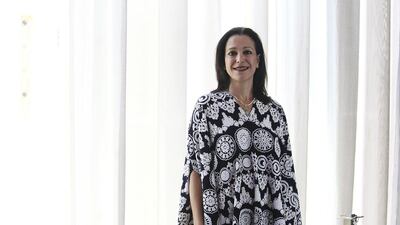Mona Ataya is the founder and chief executive of Mumzworld, an online marketplace for mother, baby and child in the Middle East. Mumzworld is now expanding its reach in the region, having secured “millions of dollars’ in a fresh round of investment in January. Ms Ataya is Lebanese by nationality. She was born and raised in Kuwait, and lives in Dubai with her husband and three children. She is also the co-founder of the online jobs search engine Bayt.com.
How do you spend your weekend?
I have three boys, my oldest are 12 year-old twins and my youngest is eight. They have rugby, football games and swim squad at the weekends, so basically my weekends involve being a mummy.
How did you become a chief executive?
This is a business that I founded four years ago. I’ve been an entrepreneur for 15 years as this is my second business (she co-founded the jobs site bayt.com with her brother Rabea Ataya in 2000). I started Mumzworld because of a need of a mother that was not satisfied. At the time, access to quality choice of products was limited, prices were expensive, the convenience of the shopping experience was also not that great, and there was no information to make informed decisions. So we set out to solve these problems – I spent hours on the internet, teaching myself. Today, we deliver to the homes of over 650,000 mothers across the Arab world.
What’s your go-to gadget?
My iPhone 6 Plus, which my husband bought me, is always with me. But I’m not a gadget person. I use it more for necessity than for pleasure.
What was the lowest point of your career?
There have been daily ups and downs. As an entrepreneur you’re pioneering an idea and by definition, you’re going to get plenty of naysayers, and the challenges far outweigh the positive reinforcements. There are days when I wake up and say this is a difficult journey. Being an entrepreneur, being a woman, pioneering e-commerce in an eco system that’s very underdeveloped is a vertical challenge. And it’s daily that I have to basically climb that wall. But it’s a choice, and life is about choices.
What advice would you offer others starting out in your business?
The key is just to keep on going, to really fundamentally believe in what it is you are trying to achieve and have a clear vision in your mind. Starting a business is not easy. Being an entrepreneur is really about a mindset, it’s about how you live rather than what you start and whether you are willing to really dedicate your life to juggling between your family and your work life. It’s a daily struggle.
What is your most indulgent habit?
I love taking my children to a coffee shop, having a cup of coffee and a pie and watching them doing their maths. Instead of them doing their homework at home, I have my three children in front of me, in a very cosy environment doing something useful. That for me is great. I also occasionally watch brainless TV – I don’t have much time for that but when I do, I enjoy it. Every time my husband walks in and sees what I’m watching, he shouts “this is unbelievable”.
What do you have on your desk at work?
Just yesterday I was saying that I don’t work well in a cluttered environment and I don’t like clutter. But at the same time, I have too much on my desk – bills, documents and things I need to sign.
What can’t you live without?
My children and my husband, they are my drivers.
How do you achieve a work-life balance?
I wake up every day and say “today, my priority is this”. It’s a daily decision I make. This notion that there is a balance is wrong. There are decisions that you make based on where you want to be in a year, five years or 10 years from now. I feel I am pulled in all directions all the time, but my children are my priority. So when I do juggle other things, I have to ask myself “is that impacting them negatively? Is it long term? What do I need to do as a mother with responsibility to make the right decision?”
If you could swap jobs with anyone, who would it be and why?
I’ve been an entrepreneur for 15 years, and I’ve always been very active. But when I had my twin boys, I took four years off completely – I did nothing but be a mummy. I loved every moment of it because I gave the same kind of energy and creativity to raising my children as I did with my job. Just as every day I used to walk into the office and say “today I’m going to create this great product and customer experience”, I’d wake up and say “today I’m going to teach my kids all about the moon” or “how to express themselves”. So if I could swap jobs with anyone, I’d go back to being a full-time mother, because that’s a job. And it’s the hardest job.
business@thenational.ae
Follow The National's Business section on Twitter

